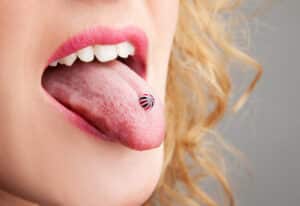
Oral piercing risks
An oral piercing may look great, but having something constantly rubbing against your teeth and gums can do a lot of damage. The piercing can chip or crack teeth, which can lead to an infection and even more serious problems. If it rubs against the gums, it can cause damage to the gums and gum recession. It can damage restorative dental work, such as crowns. And, because oral jewelry can lead to excess saliva, it can make it difficult to chew, swallow, and even talk.
An oral piercing can also mean health risks for the entire body. Bacteria in the mouth can get into the site of the piercing and can travel through the body and end up in the heart, causing endocarditis (inflammation of the heart).
Caring for an oral piercing
The most important advice for anyone who has an oral piercing is to keep your teeth and mouth clean. Brush and floss often, and make sure you see your dentist twice a year, or whenever you think there may be a problem.
Take your piercing out if you will be playing sports or engaging in an activity where there is a chance your piercing might get caught on something or someone might smash into you. Avoid putting objects in your mouth such as pens and pencils, because these can carry bacteria, and avoid playing with your piercing. And, avoid tobacco products.
If a member of your family wants an oral piercing, make sure they know how important it is to take good care of it. Hopefully there won’t be any issues with your child’s oral piercing, but if there are you can always call Soft Touch Dentistry. Contact the Brighton office at (617) 782-9250 or the Newton office at (617) 332-8146 for an appointment today.
